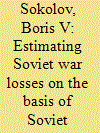| Srl | Item |
| 1 |
ID:
133763


|
|
|
|
|
| Publication |
2014.
|
| Summary/Abstract |
The problem of calculating the Soviet losses in the Second World War has confronted scholars with potentially insoluble difficulties. Especially in the first year of the war, during the catastrophic defeats and disorganized retreats, individual records on Soviet military personnel were either simply not kept or were lost or destroyed. Even during the war, the Soviet government criticized the failure to keep casualty lists up to date and noted that often soldiers were killed or went missing even before they were formally added to the unit rosters. The Red Army had no equivalent to the dog tag. Many soldiers, out of superstition, refused to wear the smertniki-little wooden cases that held identification information on slips of paper-believing that a wearer was ordained to die. Official estimates to this date, however, appear plainly understated. The author proposes a new method for estimating the Soviet personnel losses in the Second World War, based on the 1939 and 1956 censuses of the Soviet population.
|
|
|
|
|
|
|
|
|
|
|
|
|
|
|
|
| 2 |
ID:
135928


|
|
|
|
|
| Summary/Abstract |
The author proves that the Soviet economy in the middle of 80s was overestimated as many as 4 times by the Soviet official statistics due to pripiski—deliberately overstated data on the produced goods and services and maximally overestimating the cost of production by using both the most costly raw materials and equipment and an increased number of intermediate operations, each of which is produced in a separate enterprise. All such things cause a dramatic increase in the gross cost of production at the expense of double accounting, but without any increase in the physical volume of output or the improvement of its consumer qualities. Such double accounting is called as ‘imaginary value’. The author estimates the real Soviet GNP as only one sixth of the American one in the middle of 80s. And the Soviet Military expenditures constituted about 42 percent of GNP. ‘Imaginary value’ was a very important means of distribution and re-distribution of goods in the Soviet planned economy.
|
|
|
|
|
|
|
|
|
|
|
|
|
|
|
|